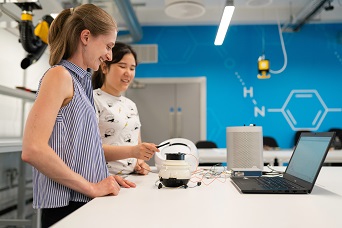EXPANDING GIRLS’ HORIZONS IN STEM PATHWAYS THROUGH INTERVENTIONS WITH FEMALE ROLE MODELS

Over the past 15 years various initiatives and programs have been developed in many international contexts to reverse women’s underrepresentation in science, technology, engineering, and mathematics (STEM). These initiatives and programs are linked to gender inequalities in boys’ and girls’ performance in scientific and technological subjects, and also to girls’ growing lack of interest in choosing STEM studies, particularly in male-dominated STEM fields, such as engineering programs or computer science. These gender gaps are highly relevant not only because they generate social injustice, but also because of the significant loss of women’s talent in STEM.
HORIGESTEM addresses the hypothesis that interventions with female role models working in STEM will raise girls’ interest in STEM subjects and change stereotypes about women working in scientific and technological fields. Two studies will be therefore conducted to examine to what extent interventions with female role models working in STEM raise girls’ interest and enrolment in STEM fields:
- a quasi-experimental study with secondary students will analyse how the mere exposure of girls and secondary students to female role model sessions will enhance their STEM competence, their motivation and interest in STEM careers, and will reduce their stereotypes about women in STEM.
- a qualitative study will explore the effectiveness to attract and retain women in STEM of a mentoring program that promotes girls’ talent in STEM throughout the course of secondary education and beyond.
Funded by: Grant PID2021-123049OB-I00 funded by MICIU/AEI/10.13039/501100011033 and by ERDF “A way of making Europe”.
Start date: 01/09/2022 – End date: 31/08/2025
Principal Investigator: Milagros Sáinz Ibáñez, director of Gender and ICT (IN3 – UOC)
Research team:
Julio Meneses Naranjo (Lecturer at Universitat Oberta de Catalunya, researcher at Gender and ICT, IN3-UOC)
Sergi Fàbregues Feijóo (Lecturer at Universitat Oberta de Catalunya, researcher at Gender and ICT, IN3-UOC)
Susana González Pérez (Lecturer at Universidad CEU San Pablo)
Collaborators:
Campbell Leaper (Professor at the University of California, Santa Cruz)
Research assistants:
Beatriz Soledad López Pérez (Gender and ICT, IN3 – UOC)
María José Romano Serrano (Gender and ICT, IN3 – UOC)
Funding body:

Related projects: